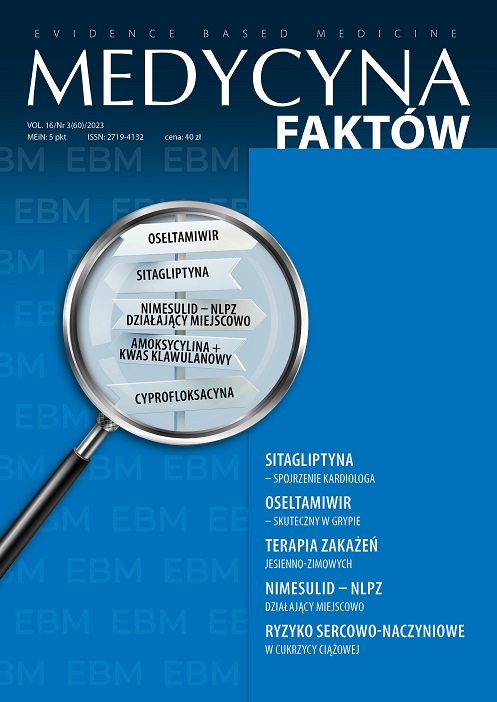Korzystny wpływ połączenia kwasu masłowego i probiotyków na zaburzenia czynności jelit z uwzględnieniem antybiotykoterapii Artykuł przeglądowy
##plugins.themes.bootstrap3.article.main##
Abstrakt
Kwas masłowy jest substancją naturalną, produkowaną w okrężnicy, o szerokim wpływie na jelita – troficznym, przeciwzapalnym, utrzymującym integralność bariery jelitowej. Powstaje on przy współudziale bakterii saprofitycznych, dlatego w sytuacji zaburzenia mikrobioty jelitowej ilość maślanu w jelicie spada. Suplementacja bakteriami probiotycznymi, zwłaszcza Lactobacillus spp., Bifidobacterium spp., może naturalnie zwiększać stężenie maślanu.
##plugins.themes.bootstrap3.article.details##
Jak cytować
Waśko-Czopnik, D. (2023). Korzystny wpływ połączenia kwasu masłowego i probiotyków na zaburzenia czynności jelit z uwzględnieniem antybiotykoterapii. Medycyna Faktów , 16(3(60), 363-366. https://doi.org/10.24292/01.MF.0323.15
Numer
Dział
Artykuły
Copyright © by Medical Education. All rights reserved.
Bibliografia
1. World Health Organization. WHO report on surveillance of antibiotic consumption: 2016-2018 early implementation. Geneva; 2018.
2. Narodowy Program Ochrony Antybiotyków 2/2015.
3. Levy M, Kolodziejczyk AA, Thaiss CA et al. Dysbiosis and the immune system. Nat Rev Immunol. 2017; 17(4): 219-32.
4. McKenzie YA, Bowyer RK, Leach H et al. British Dietetic Association systematic review and evidence-based practice guidelines for the dietary management of irritable bowel syndrome in adults (2016 update). J Hum Nutr Diet. 2016; 29: 549-75.
5. Gomaa EZ. Human gut microbiota/microbiome in health and diseases: a review. Antonie Van Leeuwenhoek. 2020; 113(12): 2019-40.
6. Cukrowska B. Znaczenie programowania mikrobiotycznego w rozwoju przewlekłych chorób nieinfekcyjnych. Standardy Medyczne. Pediatria. 2016: 1019-28.
7. Karakan T, Ozkul C, Kupeli Akkol E et al. Gut-brain-microbiota axis: antibiotics and functional gastrointestinal disorders. Nutrients. 2021; 13(2): 389.
8. Mc Farland LV. Epidemiology, risk factors and treatments for antibiotic-associated diarrhea. Dig Dis. 1998; 16(5): 292-307.
9. Palleja A, Mikkeelsen KH, Forslund SK et al. Recovery of gut microbiota of healthy adults following antibiotic exposure. Nat Microbiol. 2018; 3(11): 1255-65.
10. Bartlett JG. Clinical practice. Antibiotic-associated diarrhea. N Engl J Med. 2002; 346: 334-9.
11. Kumar LS, Pugalenthi LS, Ahmad M et al. Probiotics in Irritable bowel syndrome: a review of their therapeutic role. Cureus. 2022; 14(4): e24240.
12. Lupu VV, Ghiciuc CM, Stefanescu G et al. Emerging role of the gut microbiome in post-infectious irritable bowel syndrome: a literature review. World J Gastroenterol. 2023; 29(21): 3241-56.
13. Hill C, Guarner F, Reid G et al. Expert consensus document. The International Scientific Association for Probiotics and Prebiotics consensus statement on the scope and appropriate use of the term probiotic. Nat Rev Gastroenterol Hepatol. 2014; 11(8): 506-14.
14. Plaza-Diaz J, Ruiz-Ojeda FJ, Gil-Campos M et al. Mechanism of action of probiotics. Adv Nutr. 2019; 10(suppl 1): S49-S66.
15. Zhang M, Wang Y, Zhao X et al. Mechanistic basis and preliminary practice of butyric acid and butyrate sodium to mitigate gut inflammatory diseases: a comprehensive review. Nutr Res. 2021; 95: 1-18.
16. Seethaler B, Nguyen NK, Basrai M et al. Short-chain fatty acids are key mediators of the favorable effects of the Mediterranean diet on intestinal barrier integrity: data from the randomized controlled LIBRE trial. Am J Clin Nutr. 2022; 116(4): 928-42.
2. Narodowy Program Ochrony Antybiotyków 2/2015.
3. Levy M, Kolodziejczyk AA, Thaiss CA et al. Dysbiosis and the immune system. Nat Rev Immunol. 2017; 17(4): 219-32.
4. McKenzie YA, Bowyer RK, Leach H et al. British Dietetic Association systematic review and evidence-based practice guidelines for the dietary management of irritable bowel syndrome in adults (2016 update). J Hum Nutr Diet. 2016; 29: 549-75.
5. Gomaa EZ. Human gut microbiota/microbiome in health and diseases: a review. Antonie Van Leeuwenhoek. 2020; 113(12): 2019-40.
6. Cukrowska B. Znaczenie programowania mikrobiotycznego w rozwoju przewlekłych chorób nieinfekcyjnych. Standardy Medyczne. Pediatria. 2016: 1019-28.
7. Karakan T, Ozkul C, Kupeli Akkol E et al. Gut-brain-microbiota axis: antibiotics and functional gastrointestinal disorders. Nutrients. 2021; 13(2): 389.
8. Mc Farland LV. Epidemiology, risk factors and treatments for antibiotic-associated diarrhea. Dig Dis. 1998; 16(5): 292-307.
9. Palleja A, Mikkeelsen KH, Forslund SK et al. Recovery of gut microbiota of healthy adults following antibiotic exposure. Nat Microbiol. 2018; 3(11): 1255-65.
10. Bartlett JG. Clinical practice. Antibiotic-associated diarrhea. N Engl J Med. 2002; 346: 334-9.
11. Kumar LS, Pugalenthi LS, Ahmad M et al. Probiotics in Irritable bowel syndrome: a review of their therapeutic role. Cureus. 2022; 14(4): e24240.
12. Lupu VV, Ghiciuc CM, Stefanescu G et al. Emerging role of the gut microbiome in post-infectious irritable bowel syndrome: a literature review. World J Gastroenterol. 2023; 29(21): 3241-56.
13. Hill C, Guarner F, Reid G et al. Expert consensus document. The International Scientific Association for Probiotics and Prebiotics consensus statement on the scope and appropriate use of the term probiotic. Nat Rev Gastroenterol Hepatol. 2014; 11(8): 506-14.
14. Plaza-Diaz J, Ruiz-Ojeda FJ, Gil-Campos M et al. Mechanism of action of probiotics. Adv Nutr. 2019; 10(suppl 1): S49-S66.
15. Zhang M, Wang Y, Zhao X et al. Mechanistic basis and preliminary practice of butyric acid and butyrate sodium to mitigate gut inflammatory diseases: a comprehensive review. Nutr Res. 2021; 95: 1-18.
16. Seethaler B, Nguyen NK, Basrai M et al. Short-chain fatty acids are key mediators of the favorable effects of the Mediterranean diet on intestinal barrier integrity: data from the randomized controlled LIBRE trial. Am J Clin Nutr. 2022; 116(4): 928-42.
